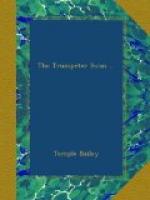“They always want to hold me back when I try to be up-to-date,” she repeated.
Randy threw an acorn at her. “Nobody can hold you back, Mother,” he said, “when you get your mind on a thing. Aunt Claudia, what do you hear from Truxton?”
“A letter came this morning,” said Mrs. Beaufort, lighting up with the thought of it. “I hadn’t heard for days before that. And I was worried.”
“Truxton hasn’t killed himself writing letters since he went over,” the Judge asserted. “Claudia, can’t we have lunch?”
“William is unpacking the hamper now, Father. And I think Truxton has done very well. It isn’t easy for the boys to find time.”
“Randy wrote to me every week.”
“Now, Mother——”
“Well, you did.”
“But I’m that kind. I have to get things off my mind. Truxton isn’t. And I’ll bet when Aunt Claudia does get his letters that they are worth reading.”
Mrs. Beaufort nodded. “They are lovely letters. I have the last one with me; would you like to hear it?”
“Not before lunch, Claudia,” the Judge urged.
“I will read it while the rest of you eat.” There were red spots in Mrs. Beaufort’s cheeks. She adored her son. She could not understand her father’s critical attitude. Had she searched for motives, however, she might have found them in the Judge’s jealousy.
It was while she was reading Truxton’s letter that the Flippins came by—Mr. Flippin and his wife, Mary, and little Fidelity. A slender mulatto woman followed with a basket.
The Flippins were one of the “second families.” Between them and the Paines of King’s Crest and the Bannisters of Huntersfield stretched a deep chasm of social prejudice. Three generations of Flippins had been small farmers on rented lands. They had no coats-of-arms or family trees. They were never asked to dine with the Paines or Bannisters, but there had been always an interchange of small hospitalities, and much neighborliness, and as children Mary Flippin, Randy and Becky and Truxton had played together and had been great friends.
So it was now as they stopped to speak to the Judge’s party that Mrs. Beaufort said graciously, “I am reading a letter from Truxton. Would you like to hear it?”
Mary, speaking with a sort of tense eagerness, said, “Yes.”
So the Flippins sat down, and Mrs. Beaufort read in her pleasant voice the letter from France.
Randy, lying on his back under the old oak, listened. Truxton gave a joyous diary of the days—little details of the towns through which he passed, of the houses where he was billeted, jokes of the men, of the food they ate, of his hope of coming home.
“He seems very happy,” said Mrs. Beaufort, as she finished.
“He is and he isn’t——”
“You might make yourself a little clearer, Randolph,” said the Judge.
“He is happy because France in summer is a pleasant sort of Paradise—with the cabbages stuck up on the brown hillsides like rosettes—and the minnows flashing in the little brooks and the old mills turning—and he isn’t happy—because he is homesick.”




